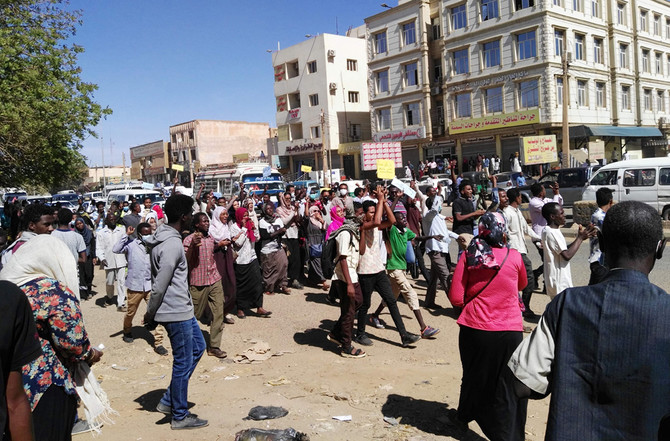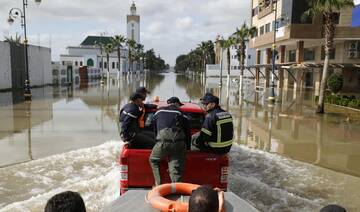KHARTOUM: Sudanese police fired tear gas on Sunday at protesters ahead of a planned march on Parliament in Omdurman, the twin city of Khartoum, witnesses said.
Security forces were earlier deployed in large numbers in anticipation of fresh protests calling on longtime ruler Omar Bashir to step down, according to activists and video clips circulating online.
The videos show hundreds of security forces in all-terrain vehicles in Khartoum and heading to nearby Omdurman, a traditional hotbed of dissent that saw hours of pitched battles between police and protesters last week.
Sunday’s anticipated protests come amid a series of strikes, already underway or planned for this week, by professional unions, including doctors, teachers, lawyers and pharmacists. Demonstrations are also expected in other cities on Sunday.
Bashir, who came to power nearly 30 years ago, insists there will be no change of leadership except through the ballot box. Already one of the longest serving leaders in the region, he is expected to run for a new term in office in elections next year.
Bashir has repeatedly warned that the protests could plunge Sudan into the kind of chaos convulsing other countries in the region.
The protests erupted Dec. 19, initially over price hikes and shortages, but soon shifted to calling on the president to step down. Rights groups last week said at least 40 people have been killed in the protests, while the government acknowledged 24 deaths. Analysts say the protests have emerged as the biggest challenge yet to the authority of the veteran leader.
The Sudanese Professionals Association (SPA), an umbrella group of trade unions that is leading the ongoing protest movement, called for fresh demonstrations on Sunday and several days over the coming week.
“We are calling for a march to Parliament in Omdurman on Sunday,” it said in a statement.
A doctors’ committee linked to anti-government protests apologized on Sunday for incorrectly reporting that a child had been killed in demonstrations in Khartoum that took place on Jan. 17.
Sudanese police said that two people had died in demonstrations that rocked Khartoum on Thursday, but protest organizers had reported that three people were killed, including a child, in clashes with riot police.
“This mistake happened because we trusted a confident source, but we are now investigating the matter,” a committee of doctors linked to the SPA said in a statement on Facebook, confirming that two people had died in the demonstrations on Thursday.
Riot police had on Thursday broken up a march on the presidential palace in Khartoum, while a rally took place later that day in the capital’s Burri district, witnesses said.
Although participants have so far been in the hundreds or low thousands, the continuing protests and strikes pose a challenge to Bashir’s rule.
The absence of explicit support by Sudan’s Arab allies has made Bashir’s position even more tenuous.
However, the protests show a lack of clear leadership and their continuation could invite another military takeover. Union leaders say they want a transitional government of technocrats followed by free elections.
Bashir’s position was further weakened when a senior cleric revealed that he and fellow clerics have implicitly suggested to the Sudanese leader in a meeting that he step down, arguing that Islam takes precedence over individuals.
In a surprise disclosure in a Friday sermon, Sheikh Abdul-Hay Youssef said the clerics presented Bashir with a list of demands, including an end to corruption, bringing to justice anyone found responsible for the latest economic crisis and an end to the killing of protesters, something that the Sudanese leader has sought to justify on religious grounds.

















